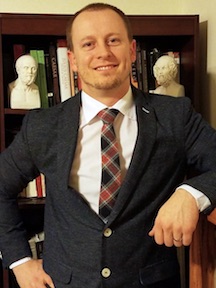By Joe Slama
Jessie Craft (ΦBK, UNC-Greensboro, 2013) seeks to make the ancient relevant as he instructs Latin students using Minecraft models of Greece and Rome.
The field of Classics, the study of ancient Greece and Rome, is often castigated as irrelevant as it is antiquated. How, the reasoning goes, can something so ancient have anything to offer today’s world, so alien to the worlds of Caesar and Pericles?
A look at the work of one innovative Latin teacher and Phi Beta Kappa alumnus from the University of North Carolina in Greensboro, however, buries those concerns.
Jessie Craft teaches Latin I-IV at Ronald W. Reagan High School in Pfafftown, North Carolina. He was recently awarded the annual Kraft Teaching Award by the Classical Association of the Middle West and South (CAMWS) for his efforts in making the Classics and Latin relevant and accessible to students of all walks of life.
He’s done that in an effort that can only be described as Herculean, or perhaps Vitruvian: Craft has constructed models of the ancient world using Minecraft, a building-block video game similar to Legos, and invited his students to do the same.
He began to use the game in a graduate course on daily life in Rome. After writing on the House of the Mosaic Atrium, Craft recalled, “I wanted to create a 3D model of it, so I made it in Minecraft.”
“From there, I began to understand the power of this game,” Craft noted in a formal statement on his teaching. “Finally, after spending the following summer researching, building, and arguing with my brother, we built the Acropolis of Athens. It was then when I knew how I would give the Classics some appeal.”
He introduced the Minecraft project, called Magister Craft, in his classroom to teach ancient architecture. Craft worked with his students on an open server to build temples, homes, aqueducts, and more within a reconstruction of the city. He later detailed his results in an article for the Classical Journal and won a CAMWS grant for the project.
Craft’s students, however, are not the only ones to benefit from this unique mode of instruction. His YouTube channel hosts scores of videos (narrated in Latin with English subtitles), including tours of cities and temples, readings from Vergil’s Aeneid, and historical reenactments. The channel is hosted under the name “Divus Magister Craft,” which can be translated as “Divine Mr. Craft.”
Magister Craft is more than technologically innovative. In his videos as well as his classroom pedagogy, Craft takes an approach that has grown among Latin teachers in recent years — treating Latin as a living language. He uses vocabulary “supported with images and realia,” he explained, and weaves in repetition and storytelling. In this shift, Craft found that “students who would normally struggle in my former traditional grammar and translation-based class, were now flourishing,” he said.
In teaching high-schoolers, Craft sees a natural benefit to studying Latin, despite its antiquity.
Without implying there is a “magical code” that they’ll find among the Latin language, Craft explained that study of Latin can convey the “founding principles of language” to students and “translate into a better command of the English language, and maybe in some ways, perhaps even more so than the study of another foreign language.”
Craft brings a wide perspective to the study of Latin that benefits from experience in multiple languages. Prior to earning a Bachelor of Arts in Classical Studies with a concentration in Latin at UNC-Greensboro, he majored in Italian Studies at the University of Tennessee in Knoxville and has also achieved some proficiency in both Spanish and ancient Greek.
Reading the Classics today rests on foreign languages; most Latin curricula operate with the goal of reading authors like Vergil and Caesar. To Craft, this grants both the Classics and foreign languages in general a central role in the liberal arts.
“You can’t have literature without a language,” Craft said. And on language, he added, “certainly, the act of communicating between humans is a very humanitarian, a very humanist act. The two go hand-in-hand.”
Craft praises ΦBK, calling the Society “the embodiment, the manifestation of those same core values, principles, and beliefs to which not only do I adhere but those which I believe are right and just independent of my own belief in them.”
His personal history with the society shows this, too, albeit in a round-about way.
When Craft was invited to join Phi Beta Kappa, he had already received communications from several honors groups and was confessedly “jaded” by constant membership requests. When he received an email from his local ΦBK chapter, he said that he penned a lengthy response, “just berating them.”
A few days later, he received a reply from another professor Craft described as a “great mentor.”
Craft remembered her email: “Jessie, I need you to come see me in my office just as soon as you can. It’s about Phi Beta Kappa.”
Naturally, he was nervous.
When he met with her, however, Craft recalled that she said, “I totally understand where you’re coming from,” but then explained “what Phi Beta Kappa is.”
With that, Craft’s perspective changed. “You are an organization that I would be proud to join,” he declared in his next communication with the chapter.
“We had some laughs,” Craft remembered.
Joe Slama, a senior at Truman State University studying Classics, was inducted into Phi Beta Kappa in spring 2017 while studying and working in Rome. Truman is home to the Delta of Missouri chapter of Phi Beta Kappa.




